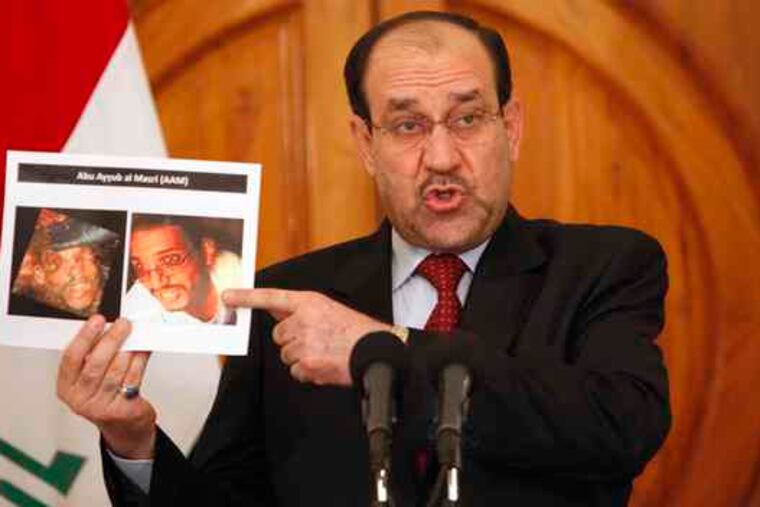Al-Qaeda in Iraq leaders killed
The pair reportedly died in an Iraqi-led strike with U.S. forces.

BAGHDAD - The United States and Iraq claimed a major victory Monday against al-Qaeda in Iraq, saying their forces killed the terror group's two top figures in the country in an air and ground assault on their safe house near Saddam Hussein's hometown.
Prime Minister Nouri al-Maliki, at a news conference, announced the killings of Abu Omar al-Baghdadi and Abu Ayyub al-Masri and showed photographs of their bloody corpses. U.S. military officials later confirmed the deaths, which Vice President Biden called a "potentially devastating blow" to the group.
The killings were announced the same day an Iraqi court ordered a recount of more than 2.5 million votes cast last month in Baghdad, a decision that could tilt the parliamentary results in Maliki's favor and inflame sectarian tensions after what has already been a contentious election.
Al-Qaeda in Iraq has proven resilient in the past, showing a remarkable ability to change tactics and adapt - most notably after its brutal founder, Abu Musab al-Zarqawi, was killed nearly four years ago in a U.S. air strike.
Still, some analysts contend, the group was far stronger then and would likely have a harder time now replenishing its leadership and sticking to a timetable of attacks.
"The death of these terrorists is potentially the most significant blow to al-Qaeda in Iraq since the beginning of the insurgency," Gen. Raymond Odierno, the top U.S. commander in Iraq, said in a statement.
Al-Qaeda in Iraq has remained a dangerous force as the United States prepares to withdraw most of its troops. The group has launched repeated attacks on civilian targets in Baghdad to try to sow chaos and exploit political deadlock after the inconclusive March 7 elections.
Monday's announcement comes at a critical time for Maliki, who has staked his reputation on being the man who can restore stability to Iraq after years of bloodshed. He is in a tight contest with secular challenger Ayad Allawi to see who will form the next government. Maliki's coalition trails Allawi's bloc by two seats in the 325-seat parliament, and neither has yet been able to secure enough support from other parties to muster a majority.
Maliki's bid to keep the prime minister's office received a second boost Monday when Iraq's election commission announced it would recount ballots cast in Baghdad, after Maliki's coalition lodged complaints of fraud. The recount could potentially give the prime minister's bloc more seats than Allawi's.
Allawi has charged that Iraqi security forces have been unfocused since the election.
But Biden, President Obama's point person on Iraq, said the deaths of the al-Qaeda in Iraq leaders underscored the Iraqi forces' overall improvement.
"The Iraqis led this operation, and it was based on intelligence the Iraqi security forces themselves developed," said Biden, who went before reporters in the White House briefing room to draw added attention to the results.
U.S. military officials have been highlighting the role of Iraqi security forces as American forces draw down. Under a plan outlined by Obama, all combat forces will be out of Iraq by the end of August, leaving about 50,000 U.S. forces there for such roles as trainers and support personnel. Those forces are to leave Iraq entirely by the end of 2011.
The U.S. military said the early Sunday raid that killed the two al-Qaeda in Iraq leaders was launched after intelligence gathered during joint operations over the last week led security forces to the elusive leaders' safe house about six miles southwest of Tikrit.
Ground forces surrounded the house and rockets were fired from the air, Maliki said. The U.S. military said an American UH-60 Black Hawk helicopter crashed during the assault, killing one U.S. soldier and wounding three; the crash was not believed to have been caused by enemy fire.
The two al-Qaeda in Iraq leaders were inside the house. Masri's assistant and Baghdadi's son, both suspected of being involved in terror attacks, also died in the raid, and 16 suspects were arrested, the military said.
Masri, the Egyptian shadowy national leader of al-Qaeda in Iraq, joined al-Qaeda camps in Afghanistan in the late 1990s and trained as a car-bombing expert before going to Iraq after the U.S.-led invasion in 2003, U.S. officials said.
Masri was able to step in quickly to take over after Zarqawi, the flamboyant Jordanian-born founder of al-Qaeda in Iraq, was killed in June 2006. The group launched a bombing campaign shortly afterward to show that al-Qaeda in Iraq was far from eliminated.
Masri's real name was Abdul-Monim al-Badawi, according to an al-Qaeda in Iraq statement last year describing the makeup of a new "War Cabinet."
Baghdadi was the self-described leader of the al-Qaeda-linked Islamic State of Iraq. U.S. military officials on Monday said his real name was Hamid Dawud Muhammad Khalil al-Zawi.
Past Iraqi claims to have captured or killed Baghdadi turned out to be wrong, and the Islamic State of Iraq has issued at least two denials of his capture. Baghdadi was so elusive that at times U.S. officials also questioned whether he was a real person or merely a composite.